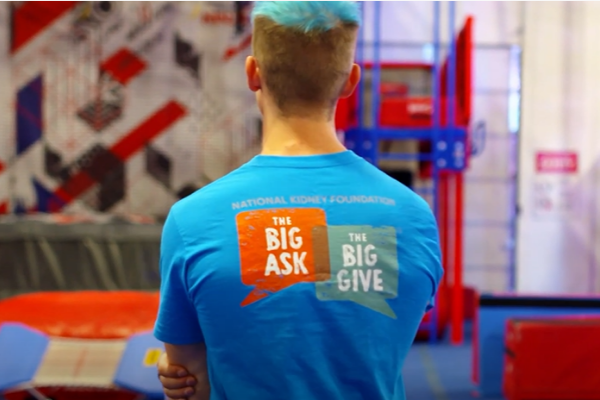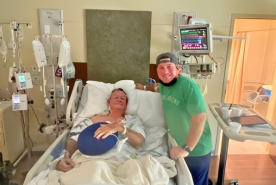January 14, 2022
At only 22, Austin Gray was a talented athlete preparing to compete in the Minneapolis American Ninja Warrior qualifying round when he heard that his childhood friend was in dire need of a kidney. Austin felt instantly compelled to donate his kidney, and, ever a determined person, he did just that.
Only 15 weeks after surgery, his performance qualified him to go to the next round of the competition. He continued to perform well and soon became the runner-up on American Ninja Warrior seasons 12 and 13. Since then, he's added youth coach and obstacle designer to his long list of accomplishments. If there was ever a living epitome of "remarkable," Austin is it.
Austin's decision
[VIDEO::http://www.youtube.com/watch?v=8VM2RbumKSY::aVideoStyle]
The day Austin heard about his friend’s kidney failure started like any other. He logged into Facebook, completely unaware that he'd soon have a life-changing conversation with his childhood friend, Aubry Adams.
While catching up, he learned that Aubry and her twin sister Kaylee both needed kidney transplants. Since childhood, the sisters had battled focal segmental glomerulosclerosis, or FSGS, a disease that attacks tiny filtering units inside a kidney. Unfortunately, their previous kidney transplants were no longer functioning normally, and the sisters were back on dialysis.
Austin felt pulled to help his friends and quickly volunteered to become a living donor. He went through medical and psychological testing and was cleared to donate his kidney to Kaylee. So he set aside his American Ninja Warrior training for a time and prepared for the transplant.
Becoming a living donor
All living donors go through a thorough evaluation. Austin received a financial consultation, a psychological assessment, and extensive medical tests to become a living kidney donor. These evaluations determined whether he was a good fit for donation.
- Financial: During the financial consultation, finances and insurance coverage are covered. If donating to a family member or friend, their insurance will pay expenses, lost wages, and some follow-up care.
- Psychological: The psychological exam ensures the donor is mentally fit for the procedure and confirms they're under no pressure from friends or family. This is an opportunity to speak freely with the team without the presence of the recipient or family.
- Medical tests: A healthcare professional will assess medical history and give a physical exam. They screen for heart or lung disease, cancer, and high kidney function. Doctors will also need to check compatibility between donor and recipient.
Learn more about the living donor evaluation.
What if the donor and recipient aren't a match?
Thanks to improved medications, a genetic link between the donor and recipient, like Austin and Kaylee, wasn’t necessary. Austin and Kaylee could have signed up for a paired exchange program if they were not a match, allowing donors to swap recipients.
Learn more about the Paired Exchange Programs.
After the transplant
There is always a small risk that the body will reject the new kidney. However, this surgery was a success. Kaylee is thriving again and doing everything she did before dialysis.
"After my transplant, I was able to go back to a normal life, my job, and school," said Kayle. "By donating his kidney to me, Austin absolutely changed my life, and I'm truly so grateful."
Four weeks after the surgery, Austin started low-level training but quickly returned to his usual training routine over an additional two weeks. His drive to recover quickly and get back to training landed him second place in American Ninja Warrior a few weeks later. He has no regrets about his decision to donate.
"There are 100,000 people who need a kidney, and I think there's definitely 100,000 people in the country who are willing to be donors but just don't know it yet. Almost everyone has the capacity to do what I did."
He's living proof that being a living donor doesn't have to slow you down.
The Big Ask Big Give Initiative
If you are considering donating a kidney, like Austin, but don't know where to start, NKF is here to help. Donating an organ is a life-changing decision, both for the recipient and the donor. There are many factors to consider:
- Am I in good physical shape and able to withstand surgery?
- Am I prepared to deal with post-operative pain and discomfort from surgery?
- Who can I rely on for practical and emotional support during surgery and recovery?
- Am I able to manage my recovery period without having problems, such as depression, anxiety, nervousness, boredom? Am I prepared emotionally and financially to seek psychological counseling or help if I need it?
NKF offers factual, unbiased information about the living donation process to help you look at to determine whether donating a kidney is the right decision for you.


















